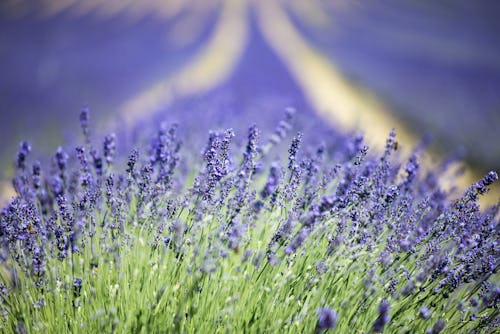Beauty
11 (Mostly Great-Smelling) Scents That'll Ward Off Annoying Mosquito Bites
You can put away the calamine lotion.

I love summertime, but the biggest downside has to be mosquitoes: From the months of June to September, I'm pretty much covered in bites, which is why scents that repel bugs and mosquitoes are part of my seasonal must-haves, along with sunscreen, a good facial mist — and, hell, a good deodorant too.
Since the weather is always so beautiful in the summer, it means spending more time outside — more barbecues, picnics, rooftop parties, beaching, pooling, and, generally, more sun. While I'm all about eating and boozing outside, once the sun sets, the mosquitoes and bugs have their heyday. If that isn't enough, mosquitoes take a particular liking to me. Why exactly? I'll never know, but I do know that repellent is my best friend in the summertime.
Spreading on calamine lotion and icing these bites aren't exactly my favorite thing, so I'm always on the side of prevention to get these buggers out of my way. So how do you make sure they stay away from you? These 11 scents can help.
We only include products that have been independently selected by Bustle's editorial team. However, we may receive a portion of sales if you purchase a product through a link in this article.
1. Deet
While not a natural option, Dr. Joshua Zeichner, Director of Cosmetic and Clinical Research in Dermatology at Mount Sinai Hospital in New York City, recommends products containing Deet. "DEET is the gold standard in preventing insect bites," he tells Bustle. "When applied to unbroken skin and clothing it is safe to use." The dermatologist does understand that some people might look for natural options, although he adds they're not as effective.
Dr. Zeichner also says to watch your mixture of Deet and sunscreen. "Mosquito repellant and sunscreen should not be applied at the same time," he says. "Sunscreen should be applied first, then repellent about 20-30 minutes later. This will avoid higher than normal amounts of DEET penetrating into your skin."
2. Lavender
According to celebrity aesthetician and general practitioner Dr. Maribel Pedrozo, lavender is a practical way to keep bugs and mosquitoes at bay during the summer, and studies have shown the terpene alcohol linalool found in lavender repels insects up to 88% more than those who use no protection. Dr. Pedrozo recommends placing a few drops on your neck or clothing to help ward off insects.
3. Peppermint
Peppermint is often cited online as a way to repel insects, and studies back up these claims. In a 2011 study, the essential oil from a peppermint plant was applied, and researchers found that the oil offered 100% protection for 150 minutes, with just one to three bites occurring after that time.
4. Geranium
Dr. Zeichner cites rose geranium as an effective scent to ward off bugs and mosquitoes. Studies have shown that while it's effective, it may not work quite as well as chemical repellants like Deet. Dr. Zeichner also cautions that, because it's an essential oil, it can irritate the skin: "Use only a small amount, or dilute it in a carrier oil before applying."
5. Citronella
Although it's common in outdoor candles, you can also wear citronella oil, which Dr. Pedrozo cites as an aromatic oil that you can apply topically. However, the National Pesticide Information Center warns that the oil can be irritating to the skin, so try patch-testing an area before heading outside.
6. Soybean Oil
Although you may have heard of citronella, soybean oil might be a bit more surprising. This vegetable-derived oil works as a protectant even on small children, according to Dr. Zeichner. According to studies, more research is needed to prove just how effective soybean oil is as an isolated repellent, but it is used in commercial products. (And, of course, stay away from this one if you're allergic to soy.)
7. Garlic
Your latest round of garlic-laden pasta may help keep mosquitoes away, but don't start rubbing cloves all over yourself just yet. Although Dr. Pedrozo does say this herb can work, studies show it's not as effective as other natural options — and if you don't have to walk around smelling like garlic, why would you?
8. Lime
For those who love the smell of citrus, lime may be a good option. Dr. Pedrozo recommends slicing the fruit in half, pricking it with cloves, and keeping it close by. You can also place it on your skin, but Dr. Alicia Zalka, MD, Associate Clinical Professor in the Department of Dermatology at the Yale School of Medicine Department of Dermatology, warns about adverse reactions, particularly if you go in the sun. "Application of some fruits on the skin, combined with UV exposure, can cause a rash known as Berloque Dermatitis or margarita rash," she says. The rash, also called phytophotodermatitis, may cause skin discoloration and blistering.
9. Basil
Basil isn't just delicious in your summertime caprese salad — basil oil has been proven to be an effective method of repelling mosquitoes. Dr. Pedrozo cites them among a host of other aromatic herbs that can be planted in order to keep insects away. Studies have also shown it to be effective when applied topically.
10. Clove Oil
Of the natural repellent options, clove oil is up there with peppermint and lavender in the best-smelling department — and it's effective, too. Dr. Zeichner explains, "Clove oil naturally contains an ingredient called eugenol, which has been demonstrated to have antimicrobial benefits and act as an insect repellent." Like most other oils, however, Dr. Zeichner recommends diluting it a bit to help avoid skin irritation.
11. Eucalyptus
Perhaps one of the best options for natural repellents is eucalyptus. While, like basil, you can use plants in a garden or on your patio to repel bugs, you can also apply the oil topically as a repellent. Studies have shown it to be effective.
This article was originally published on